Middle East Technical University
Middle East Technical University (commonly referred to as METU; in Turkish, Orta Doğu Teknik Üniversitesi ODTÜ) is a public technical university located in Ankara, Turkey. The university puts special emphasis on research and education in engineering and natural sciences, offering about 40 undergraduate programs within 5 faculties, 97 masters and 62 doctorate programs within 5 graduate schools.[2] The main campus of METU spans an area of 11,100 acres (4,500 ha), comprising, in addition to academic and auxiliary facilities, a forest area of 7,500 acres (3,000 ha), and the natural lake Eymir. METU has more than 120,000 alumni worldwide.[5] The official language of instruction at METU is English.[2]
Orta Doğu Teknik Üniversitesi | |
 | |
| Motto | Scientia Dux Vitae Certissimus |
|---|---|
Motto in English | Science is the truest guide in life |
| Type | Public University |
| Established | November 15, 1956 |
| Endowment | $400 million |
| President | Professor Mustafa Versan Kök[1] |
Academic staff | 2,500 |
| Students | 31,000[2] 2,700 (Northern Cyprus)[3] |
| Undergraduates | 23,800[2] |
| Postgraduates | 7,200[2] |
| Location | |
| Campus | Ankara: Suburban, 11,100 acres (4,500 ha, 45 km²)[2] Northern Cyprus: Rural, 137 acres |
| Colors | Red and white |
| Nickname | ODTÜ (in Turkish) METU |
| Affiliations | EUA, EAIE, IIE, GE3, SEFI, CIEE,[2] Washington University in St. Louis McDonnell International Scholars Academy[4] |
| Website | metu.edu.tr metu.edu |
Over one third of the 1,000 highest scoring students in the national university entrance examination choose to enroll in METU; and most of its departments accept the top 0.1% of the nearly 1.5 million applicants.[2] METU had the greatest share in national research funding by the Scientific and Technological Research Council of Turkey (TÜBİTAK) in the last five years, and it is the leading university in Turkey in terms of the number of European Union Framework Programme (FP) projects participation.[6][7] Over 40% of METU's undergraduate alumni choose to pursue graduate studies.[2]
History
.jpg)
.jpg)
Middle East Technical University was founded under the name "Orta Doğu Teknoloji Enstitüsü" (Middle East Institute of Technology) on November 15, 1956, to contribute to the development of Turkey and the surrounding countries of the Middle East, Balkans, and Caucasus, by creating a skilled workforce in the natural and social sciences. "Arrangements and Procedures as for the Foundation of METU, Law No 6213" was enacted on January 22, 1957, whereby the current name "Orta Doğu Teknik Üniversitesi" (ODTÜ) was adopted. Finally, the "Foundation Act No 7907", setting forth the particular standing of METU and establishing it as a juridical entity, was enacted on May 27, 1959.[8][9]
In the early years immediately following its foundation, METU was temporarily hosted in a small building that previously belonged to the Social Security Office of Retirees in Kızılay and another building near the Grand National Assembly of Turkey. In 1963, the university moved to its current location west of Ankara city center, creating the first university campus of Turkey. In 1956, the Department of Architecture initiated the first academic program at METU, followed by the Department of Mechanical Engineering in the spring of 1957. At the start of the 1957–1958 academic year, the Faculty of Architecture, the Faculty of Engineering, and the Faculty of Administrative Sciences were established. In 1959, the establishment of the Faculty of Arts and Sciences was completed. The Faculty of Education launched its academic program in 1982.[8]
Organization
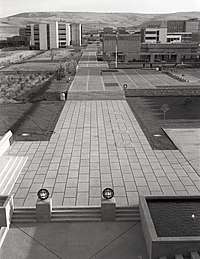

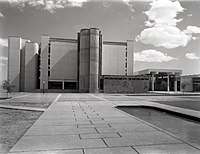
Faculties and departments
METU has 42 academic departments, most of which are organized into 5 faculties.[10] These are responsible for the undergraduate programs.
- Faculty of Architecture: Architecture, City and Regional Planning, Industrial Design
- Faculty of Arts and Sciences: Biology, Chemistry, History, Mathematics, Molecular Biology and Genetics, Philosophy, Physics, Psychology, Sociology, Statistics
- Faculty of Economic and Administrative Sciences: Business Administration, Economics, International Relations, Political Science and Public Administration
- Faculty of Education: Computer Education and Instructional Technology, Educational Sciences, Elementary Education, Foreign Language Education, Physical Education and Sports, Secondary Science and Mathematics Education
- Faculty of Engineering: Aerospace Engineering, Chemical Engineering, Civil Engineering, Computer Engineering, Electrical and Electronics Engineering, Engineering Sciences, Environmental Engineering, Food Engineering, Geological Engineering, Industrial Engineering, Mechanical Engineering, Metallurgical and Materials Engineering, Mining Engineering, Petroleum and Natural Gas Engineering
In addition to these, there are the Department of Basic English and the Department of Modern Languages in the School of Foreign Languages; the Technical Vocational School of Higher Education; and, bound directly to the President's Office, the Department of Turkish Language and the Department of Music and Fine Arts.
Graduate schools
The 5 graduate schools present in METU are responsible for the graduate programs.[10]
- Graduate School of Applied Mathematics
- Graduate School of Informatics
- Graduate School of Marine Sciences (Institute of Marine Sciences – IMS)
- Graduate School of Natural and Applied Sciences
- Graduate School of Social Sciences
Academics
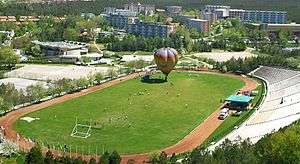
As of 2010, METU has approximately 23,000 students, of which 15,800 are enrolled in undergraduate programs, 4,500 in masters, and 2,700 in doctorate programs.[2] A further 1,500 students are attending programs in the new Northern Cyprus Campus.[11] Over 40% of METU's students go on to graduate school. Each academic year, METU hosts over 1,500 regular international students from nearly 80 different countries; and through 168 Erasmus Programme agreements and 182 bilateral exchange and cooperation agreements with universities abroad (e.g. in Central Asia, Middle East, North America, Australia, Far East and Pacific Region), it sends 350 students and receives 300 students and 50 researchers annually.[2] As of 2010, the university employs 2,500 faculty (professors and associate professors), 500 academic instructors, and over 2,000 research assistants. The number of the alumni exceeds 500,000 (about 350,000 having completed undergraduate programs).
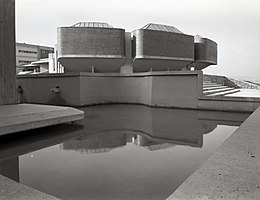
METU has about 40 undergraduate programs within the faculties of Engineering, Architecture, Arts and Sciences, Economic and Administrative Sciences, and Education, and there are 97 masters and 62 doctorate programs available in the graduate schools of Natural and Applied Sciences, Social Sciences, Informatics, Applied Mathematics, and Marine Sciences.[2] METU commonly ranks close to the top among research universities in Turkey,[12] with over one third of the 1,000 highest scoring students in the national university entrance examination choosing to enroll; and most of its departments accepting the top 0.1% of the nearly 1.5 million applicants.[2] In the Webometrics Ranking of World Universities published in July 2009, aiming to measure through web-based publications the institution size, research output, and impact,[13] METU ranked as the world's 435th (1st place within Turkey) among 15,000 universities, being the only university from Turkey to get included among the top 500.[6][14][15] Recently, the Times Higher Education World University Rankings published in September 2016 placed METU at the 501-600th position worldwide based on indicators of teaching, research, influence, innovation, and international character,[16][17] making it one of the six universities from Turkey listed among the top 600 (The other being Bilkent University at number 351–400).[16] The QS World University Rankings 2010 by Quacquarelli Symonds ranked METU as 185th worldwide in the field of engineering and technology,[18] and as 333rd in the field of natural sciences.[19]
The language of instruction at METU is English.[2] All enrolled students are required to have a degree of proficiency in English for academic purposes, and this is assured by a proficiency examination before the commence of studies. Students with unsatisfactory knowledge of English follow a preparatory English education for one year, given by the METU School of Foreign Languages. Two exceptions instructed in Turkish are the Turkish language and the history of Turkish revolution courses mandated by the Council of Higher Education.
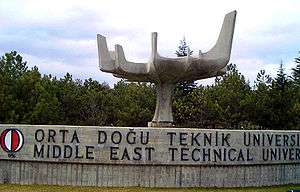
International perspective
| 2012 | 2013 | 2014 | 2015 | 2016 | |
|---|---|---|---|---|---|
| Times Higher Education World Ranking | 276-300[20] | 201-225[20] | 201-225[21] | 85[22] | 501-600[23] |
| Times Higher Education Reputation | 91-100 | 51-60 | 71-80 [24] | N/A[25] | N/A[26] |
| QS World University Rankings Engineering | 185[27] | 204[28] | 118[29] | ||
| Webometrics Ranking of World Universities | 321[30] | 321[31] | 275[32] |
Researchers from METU actively take part in many COST, EUREKA, NASA, NATO, NSF, UN, World Bank, Jean Monnet, Erasmus Mundus, Leonardo and SOCRATES projects.[2][6] METU has been involved in 56 European Union 6th Framework Programme (FP6) projects, including the coordination of 12 FP6 and 3 Networks of Excellence projects.[33] Within the 7th Framework Programme (FP7), 33 research projects involve participation of METU, since 2007.[34]
.jpg)
As of 2010, METU has 19 international joint degree programmes with European and American universities at the undergraduate and graduate levels.[2] METU is a member of various associations and networks dealing with international education and exchange, including EUA, EAIE, IIE, GE3, SEFI, and CIEE.[2] The university also actively participates in AIESEC and IAESTE summer internship programs. English as the language of instruction in all its degree programs has greatly facilitated METU's international involvements and accommodation of international students and researchers.
METU continually goes through external assessment, accreditation, and certification by international organizations. In 1991, METU initiated a long-term program to have its engineering programs evaluated by the Accreditation Board for Engineering and Technology (ABET), the recognized U.S. accreditor of college and university programs in applied science, computing, engineering, and technology. This process was concluded with the Faculty of Engineering having all its thirteen undergraduate programs declared as "substantially equivalent" to the ABET accredited programs in the USA.[35] The university has completed the evaluation process of Institutional Evaluation Programme (IEP) of the European University Association (EUA) in 2002.[36]
Because of METU's effort to maintain international standards, the Faculty of Engineering was awarded in 1977 the "Silver Badge of Honor" by the UNESCO International Center for Engineering Education and the "Meritorious Achievement Award in Accreditation Activities" by the Institute of Electrical and Electronics Engineers (IEEE). METU was awarded the international Aga Khan Award for Architecture in 1995 for its forestation program.
Being the pioneer institution of the country to connect to the Internet backbone in the early 1990s, METU also manages Turkey's Country Code Top-level Domain (ccTLD) (the ".tr" domain).[37]
METU library
The METU main library has one of the largest collections in Turkey,[38] containing nearly 489,000 books[39] classified according to the Library of Congress Classification (LCC) scheme.[40] The library subscribes to 1,500 print journals (170,270 volumes) and it provides access to 50,537 electronic journals, 200,120 electronic books, and 66 electronic reference sources.[41] The library collections also hold over 1,780 book and serial CDs, 1,300 doctoral dissertations and 11,600 masters theses. Abstracts for doctoral dissertations and some master theses from North American colleges and universities and some accredited international universities are also provided, starting from 1861, with full texts available from the year 1997.[42] All of library's collections are predominantly in English, but there are also items in Turkish, German, and French.
Campuses
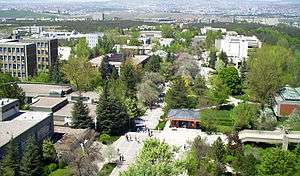
Ankara campus
METU main campus in Ankara, used by the university since 1963, is the first university campus of Turkey. It is situated about 20 km west of central Ankara and encompasses an area of 11,100 acres (4,500 ha), of which 7,500 acres (3,000 ha) constitute the METU Forest.[2] The campus grounds was transformed into a forest with the continuing help of students and volunteers since the foundation of the university.[43] The creation of this distinctive campus with its forest was spearheaded by the METU rector from 1961 to 1969, Kemal Kurdas.
Lake Eymir near Gölbaşı, inside the campus, is used by the students and faculty for rowing and recreational activities. The campus is accessible by several types of public transport, and the construction of METU subway station of the Ankara Metro on the main entrance to the campus (gate A1) is completed in 2014.
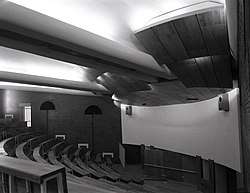
.jpg)
Northern Cyprus campus
The METU Northern Cyprus Campus, first overseas campus of a Turkish university, 50 km west of Nicosia on the island of Cyprus, admitted its first students during the academic year 2002–2003, but the doors were officially opened in Cyprus in September 2005.[44]
Erdemli campus
METU Erdemli campus in Mersin Province on the Mediterranean coast, used by the Institute/Graduate School of Marine Sciences (Deniz Bilimleri Enstitüsü) since 1975, is the first campus of METU out of Ankara. It is situated about 45 km from Mersin. Campus area is 660,000 m², close to the shore and surrounded by lemon trees. The laboratory space is about 700 m². METU-IMS Harbor is an important shelter for marine biological diversity on the Mersin coast. The harbor is the only intact rocky habitat along the long sandy coast.
Live footage from all campuses can be accessed via METU-CAM, a collection of six webcams in METU main campus, one in METU Northern Cyprus Campus, and one in the Graduate School of Marine Sciences, in Erdemli, Mersin.
METU-Technopolis
METU-Technopolis, or METUTECH, is the first science and research park of Turkey.[45] Founded within the campus, it aims to facilitate the development of companies that conduct substantial research and development to produce high-tech products and services through benefiting from METU's research capacity and information pool. Priority is given to companies executing research and development work on information technologies, advanced materials, energy, automotive, chemistry, biology and environment technologies.
As of 2009, the METU-Technopolis project employs about 3,300 personnel, approximately 2,700 of which are researchers (86% of the total staff are university graduates, and 23% have MS, MA, or PhD degrees), working within 240 firms.[46] Around 90% of the firms are small and medium enterprises (SMEs), 65% of these are specialized in information and communication technologies, 25% in electronics, and 15% in other sectors such as aerospace, environment, bio-technology, nanotechnology, and advanced materials.[46] The company profile also includes multinationals such as SBS, MAN, Cisco, and Siemens. To promote entrepreneurship and innovation, the incubation center at the METU-Technopolis serves 38 start-ups and micro sized companies, most of which start their life a spin-offs from METU research projects.
METU-Technopolis hosts partners to several European Union Sixth Framework Programme (FP6) projects,[45] such as NICE, SINCERE,[47] ReSIST,[48] SmeInnov8gate[49] and IP4INNO.[49]
Student life and culture
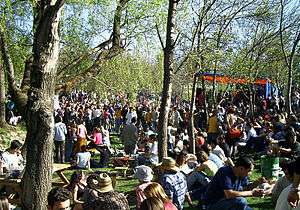
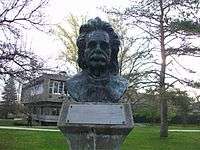
The student life at METU is marked with activities of student societies, frequent political protests, and festivals. The Cultural and Convention Center continually hosts a wide spectrum of cultural events and also regular occurrences such as the METU Jazz Days and METU Art Festival. The event with the largest number of participants is the annual METU Spring Festival, a five-day-long series of open-air concerts and exhibitions held at the main campus.
There are various traits shared by METU students, including the usage of an English–Turkish jargon (METUrkish, ODTÜrkçe as once named by an alumni artist in an art project) which apparently stemming from the fact that English is the language of instruction covering academic processes and student life (and blending into campus language similar to Persian, Arabic and later French in the past blended into Turkish to form Ottoman technical language), which reputedly is not liked much by the students of other universities; and the omnipresent word "Hocam" (meaning "My Teacher"), which is used by METU students to address anyone from bus drivers to senior faculty members. Underneath this phrase lies the philosophy that everyone has something to learn from each other.
The main campus has dormitory capacity for nearly 7,000 students who benefit from the shopping center, banks, post office, and a wide variety of sports facilities, including gymnasiums, tennis courts, basketball and football fields, jogging trails, Olympic-size indoor swimming pool, and an outdoor swimming pool.[2]
Student organizations
There are numerous student organizations active in METU.[50] Some of these are:
| Abbreviation | Full name | Founded | Description | External link |
|---|---|---|---|---|
| METU Aikido | METU Aikido Society (ODTÜ Aikido Topluluğu) | 2001 | The society of METU for people who are interested in Japanese martial art Aikido and also the biggest Aikido Dojo in Turkey. METU Aikido Society organises International Aikido Festival every year at METU. Visit official website. | |
| OCİT | METU First Aid and Life Saving Society (ODTÜ Cankurtarma ve İlkyardım Topluluğu) | 1992 | OCİT aims to teach first aid and what to do in emergence situations. It's for gaining awareness of first aid and saving people. Further information visit official website | |
| METU MECH | METU Mechanical Engineering and Innovation Society (ODTÜ Makina ve İnovasyon Topluluğu) | 2009 | METU MECH is a technical and social student club. Society activities varies from engineering projects to free lectures in numerous areas. The main aim of the club is to enhance scientific knowledge in METU and to provide a place where the undergraduate level research and development activities can be done. Society has an annual event named "ODTÜ Sanayi Günleri (OSG)" which involves large company presentations as well as seminars. | |
| BIYOGEN | METU Biology and Genetics Society | 2004 | METU BIYOGEN is a student club which aims to improve the understanding of basic sciences, especially Biology and related sciences such as Evolutionary Biology within METU and also throughout Turkey. By using its subgroups such as Evrim Ağacı (Eng: Tree of Evolution), Yaşam Ağacı (Eng: Tree of Life) magazine, AIDS Day Committee, etc. it organizes events that are open to public, in which the advancements in basic sciences are promoted and the public is informed. The society is also involved in academical research in basic sciences. Every year, the society organizes the largest Evolutionary Biology conferences of Turkey that are open to public, each of which includes more than 600 international participants. | |
| HUT | METU Aerospace Students Society (EUROAVIA Ankara) | The aerospace interested students society of METU and one of the biggest members of the European Association of Aerospace Students (EUROAVIA), It organizes local events (e.g. seminars, parties, BBQs, speeches, scaled-model aircraft courses, aviation history lectures) and takes part in international events of EUROAVIA (e.g. congresses, fly-ins, symposia). | ||
| HAT | METU Aviation Club Paragliding Group | 1992 | The group has educated hundreds of people who love aviation and paragliding, and has set several records in Turkey. The training place frequently used by the group is Racon hill in Ankara, while for more advanced trainings the group organizes trips to other provinces of the country. | |
| CCLUB | METU Computer Club | 1989 | The Computer Club aims to inform the members about computer technologies and increase the number of sources written in Turkish about computer science. CClub has been organising the Traditional Programming Contest every year since 1997. The club also has an electronic magazine called "e-bergi" which is published every month on the website http://www.e-bergi.com . | |
| IEEE | IEEE METU Student Branch | The METU branch of Institute of Electrical and Electronics Engineers (IEEE) is one of the most active student societies on campus. Having twelve student sub-branches, IEEE METU Student Branch gets involved in both technical and social activities. The society is also active in Europe-wide projects and organizations such as the EESTEC. IEEE METU publishes the magazine Biltek four times a year. | ||
| VT | METU Productivity Club (Odtü Verimlilik Topluluğu) | 1992 | A willing and active group aiming to foster relationships between the students, academics, and business world. With 70 enthusiastic active members and lots of beneficial projects, the club reaches a large student profile, especially to the engineering and management students. METU Productivity Club is the first Turkish member of the European Students of Industrial Engineering and Management (ESTIEM), connecting the club to Europe since 1996. | |
| SDT | METU Socialist Thought Club (Sosyalist Düşünce Topluluğu) | 1965 | One of the oldest societies of METU. It was founded in 1965 by 12 socialist students. During the beginning of the 1970s, it had more than 400 members. It was closed by rectorship in 1971, as a part of the oppressive policy of the oncoming military coup in the country. SDT was refounded in 2002 by students with massive events in the campus. | |
| KGT | METU Classical Guitar Society (Klasik Gitar Topluluğu) | 1975 | Founded by Ahmet Kanneci in 1975, it is Turkey's first guitar society and Ankara's first serious guitar education organization. The society aims to introduce and spread classical music culture. The society has raised some of the most talented artists (such as Ahmet Kanneci, Cem Duruöz, Orhan Anafarta, Emre Sabuncuoğlu, and Gutay Yıldıran) and has been an active supporter of classical music with its voluntary classical guitar lessons, continuous music activities, and the annual International Classical Guitar Festival (which is also the longest running classical guitar festival in Turkey). | |
| METU Capoeira Society | 2002 | A student society that deals with martial art capoeira. Founded by Şeyda Kavak in 2002. Its main focus is capoeira;but also focuses on Brazilian Culture. Since 2010, it is the representative of Muzenza. The official website is www.parande.com | ||
| THBT | Turkish Folklore Club (Türk Halk Bilimi Topluluğu) | 1961 | One of the oldest student societies in METU, mainly engaging in folk dance and folk music. It opens free courses for Turkish folk instruments and folk dances. Anatolian Musical Festival and Folklore Days are the events that the society organizes annually. | |
| ORT | METU Robotic Society (ODTÜ Robot Topluluğu) | 2000 | A technical student society. Robotic Society organizes free technical courses to METU students. The society enters Formula-G in Turkey every year. MEŞ-e, the solar car built by the Robotic Society won the Formula-G 2005. Besides, The International METU Robotics Days event is hosted annually by the society. | |
| ADT | Atatürk's Thought Club | 1989 | A student society involved in political activities. The group organizes panel discussions and debates on various aspects of politics. | |
| FPIRC/DPUİT | METU Foreign Policy and International Relations Club | 1992 | The club consists of 5 sub-groups which are "Hariciye"(biannual foreign affairs magazine which is published in Turkish), "News Report" (weekly journal of world news and student opinions on foreign affairs), "METU Model United Nations Society" (Model UN team is one of the most successful university level debate teams of Turkey), "EUROsimA" (abr. of "EURO"pean Union "sim"ulation in "A"nkara; an annual conference which simulates European Union, 10th annual session took place in 2014), and Conference&Public Relations (which arranges prof chats and visits to ministries, and provides coordination of 5 sub-groups) | |
| ILKYAR | First Aid Society | Aiming to introduce the concepts of moral and material aid to the elementary and high school students. The society organizes activities to raise money for these aids and it cooperates with many other companies and charities. | ||
| DKSK | Mountaineering & Winter Sports Club | 1963 | An important sports society in METU. This society became famous after their trip to the peak of Everest. The first Turkish female summitter, Eylem Elif Maviş, is a member of the society. | |
| KTMT | Turkish Classical Music Club (Klasik Türk Müziği Topluluğu) | Another society on music. The scope of KTMT is mostly on classical Turkish music instruments. Like THBT, KTMT also organizes free courses to students. | ||
| Book Club | 1996 | A student society about literature, books, and reading. The society organizes reading sessions every term and aims to increase students' scope of reading and intellectual abilities. Apart from organizing seminars about writers and literature, the society hosts renowned authors for panels. | ||
| SFFS | Science Fiction and Fantasy Society (Bilim Kurgu ve Fantazi Topluluğu) | A student club that unites students who are interested in science fiction and fantasy literature, cinema, comic Books, role playing games. The two major activities of the club are Treasure Hunt, one of the oldest and most popular activities of METU Spring Fest, and METUCON, a science fiction and fantasy convention held annually. Apart from TH and METUCON, the club organizes seminars and reading groups on science fiction and fantasy genre and film shows. Also a library dedicated to science fiction and fantasy literature is formed by the members of the club in years and everyone in the university can utilize it. | ||
| Chess Club | A student society with real chess-lover members. The club organizes several tournaments and activities about chess. | |||
| KDO | METU Karate-Do Club | 1984 | A branch of the METU Sports Club training Karate-Do in the style of Shotokan since 1984. Is a member of the World Karate Federation (WKF) and the World Shotokan Karate-Do Federation (WSKF). Attends in seminars and competitions worldwide. Achieved gold medal in 2004 WSKF World Championships[51] held in Tokyo, Japan. | |
| METU Bridge Club | A student society dedicated to introduce the game of bridge to the students of METU and eventually develop them into strong players. The club supplied a considerable number of young players to the Turkish Youth Bridge Teams (U21, U26, and Girls) over the last decade. | |||
| ODTÜ MT | METU Music Societies | A student society with a primary mission of supporting amateur music (especially rock and related genres) since late 80s. The Music Societies is a very active society with events like Lake Festival, Metal Days, Amateur Music Days, Rock'n Blues Days, Rock Festival, and part of METU Spring Festival with no major sponsorship support and with fully voluntary work of society members. The society acts like a school for amateur musicians mainly in the genres of rock, metal and blues. | ||
| METU Classical Music Society | Aiming to organize concerts and recitals related to classical music. | |||
| ODO | METU Players (ODTÜ Oyuncuları) | 1960 | Metu Players is a university theatre club. | |
| METU Musical Society "The Company" (ODTÜ Müzikal Topluluğu) | 1997 | A student society enacting musicals on various venues throughout the country. | ||
| METU Debating Society (ODTÜ Münazara Topluluğu) | 2007 | A debating club hosting and attending to national and international British Parliamentary Style debating tournaments. | ||
| AAT | METU Amateur Astronomy Society (ODTÜ Amatör Astronomi Topluluğu) | 1986 | A club of amateur astronomy enthusiasts to share the latest news and to give seminars to other students about astronomy. |
Notable members
Faculty
- Behram Kurşunoğlu (1956–1958) – physicist, B.Sc. and M.Sc. at University of Edinburgh and Phd in University of Cambridge, best known for his works on unified field theory and participated in the discovery of two different types of neutrinos in the late 1950s
- Cahit Arf (1967–1980) – known for Arf invariant, B.Sc. and M.Sc. in mathematics at École Normale Supérieure
- Erdal İnönü (president 1970–1971, faculty 1964–1974) – B.Sc. and M.Sc. in physics at Middle East Technical University and Phd. at California Institute of Technology and former Prime Minister of Turkey
- Feza Gürsey (1961–1974) – Theoretic physicist – B.Sc. in mathematics and physics at Istanbul University and Phd at Imperial College London and receiver of Wigner Medal in 1986
- Halil Berktay (1992–1997) – Historian, currently at Sabancı University
- Kemal Derviş – (1973–1976) – economist – Alma Mater: London School of Economics, Princeton University former head of the United Nations Development Programme, former vice-president of the World Bank for the Middle East, former Deputy Prime Minister of Turkey
- Kemal Karpat (1958–1959, 1968–1971) – Historian, currently at University of Wisconsin–Madison
- Hakkı Ögelman (1970–1990) – physicist and astrophysicist
- Oktay Sinanoğlu – physical chemistry, molecular biophysics and biochemistry – B.Sc. and Phd at University of California, Berkeley, M.Sc. at Massachusetts Institute of Technology receiver of Humboldt Prize in 1973 and two-time nominee for Nobel Prize in Chemistry.
- Ordal Demokan (1946–2004) – physicist, electrical engineer
- Ulus Baker – Sociologist
Alumni
- Abdullah Atalar (B.Eng.) in electronics engineering, M.Sc. and Ph.D. in Stanford University, president of Bilkent University
- Ahmet Bozer (B.BA.) – vice president of The Coca-Cola Company
- Alev Alatlı (B.S. 1963) – Economics, economist, writer and columnist
- Ali Babacan (B.S. 1988) – M.BA at Kellogg School of Management, former minister of Ministry of Foreign Affairs of Turkey, former minister of Ministry of Economy (Turkey) and former Deputy Prime Minister of Turkey and former Chief Negotiator for Turkish Accession to the European Union
- Ataç İmamoğlu (B.Eng.) electrical engineering – Ph.D. Stanford University, former researcher at Harvard University and currently head of Quantum Photonics Group and professor at ETHZ (Swiss Federal Institute of Technology)
- Aylin Nazlıaka (B.S.) – Economics, businesswoman and politician, Emerging Leaders program at Harvard Kennedy School and former lecturer at Bilkent University, member of Republican People's Party
- Amir Farshad Ebrahimi (Ph.D.), Human rights activist in Iran, journalist
- Burçak Özoğlu Poçan (B.S.) – Mountaineer, one of the four Turkish female summiters of Mt. Everest
- Naşide Gözde Durmuş (B.S. 2007) – scientist at Stanford University, recognized among the "World's Top 35 Innovators Under 35" (TR35) in 2015, as a pioneer in biotechnology and medicine, by MIT Technology Review
- Can Dündar (M.S. 1988, Ph.D. 1996) – journalist, B.S. in journalism at London School of Journalism, receiver of Reporters Without Borders price in 2015
- Cevdet Yılmaz (B.Sc.) – Economics, Ph.D. in Bilkent University and former Deputy Prime Minister of Turkey and minister at Ministry of Development (Turkey)
- Cüneyd Düzyol (1988) – B.Eng. in Civil Engineering, M.Sc. in economics at University of Illinois at Urbana–Champaign and former minister at Ministry of Development (Turkey)
- Ece Sükan (B.S. 1998) – Turkish model and former editor-at-large at Vogue Turkey
- Elif Şafak – Best-selling Turkish novelist and columnist, receiver of Ordre des Arts et des Lettres in 2010
- Emin Çölaşan – Famous Turkish dissenter journalist/columnist
- Eren Bali (B.S. 2005) – Mathematics and Computer Engineering, founder and CEO of Udemy
- Erdem Duhan Özensoy (B.S. 2009) – Businessman, boardmember of Kimetsan
- Erdem Başçı (B.Sc.) electronic engineering – M.Sc. in Johns Hopkins University, M.Sc., Ph.D. and professor of economics in Bilkent University and head of Central Bank of the Republic of Turkey
- Erol Gelenbe (B.S. 1966) electronic engineering – MSc. and Ph.D. at Polytechnic Institute of New York University, D.Sc. at Pierre and Marie Curie University and professor at Imperial College, London
- Eylem Elif Maviş (B.S., M.B.A.) – Mountaineer, first Turkish female summiter of Mt. Everest
- Fikri Işık – Educator, politician and Ministry of Science, Industry and Technology (Turkey)
- Gülnur Tumbat – Academic of Marketing, mountaineer
- Hakan Topal (B.Sc. 1996, M.Sc. 1999) – Civil Engineering and Gender and Women's Studies – Artist, professor at Purchase College, New York
- Ibrahim Tarik Ozbolat (B.S. 2006, B.S. 2007) Mechanical engineering – academician at the Pennsylvania State University
- Ilkay Altintas (B.S. 1999, M.S. 2001) Computer engineering - Chief Data Science Officer of San Diego Supercomputer Center
- Javaid Laghari (M.S. EE 1975) – Ph.D. SUNY Buffalo 1980, former senator in Pakistan Senate, former president and project director SZABIST, chairperson Higher Education Commission (HEC)(YOK), Pakistan, coordinator general COMSTECH, commissioner higher education, Ministry of Education, UAE
- Kürşad Tüzmen (B.S. 1981) – M.Sc. in international relations at University of Illinois and former Minister of International Trade and Customs (Turkey)
- Mehmet Ali Talat (M.Sc. 1977) – President of Turkish Republic of Northern Cyprus
- Mehrafza Mirzazad Barijugh (B.S. 2009) – Industrial designer Red Dot Design: Design Concept Best of the Best award 2010
- Nabi Avci (B.S. 1986) – board member of Scientific and Technological Research Council of Turkey chairman of the Turkey National Committee of UNESCO, minister of Ministry of National Education (Turkey)
- Müge Fermen (B.S. 1986) – First female aeronautical engineering graduate. MS in aerospace engineering and PhD in mechanical engineering from University of Dayton, Ohio, US. Award-winning program manager in R&D.
- Salih Neftçi (B.S.) – economist, financial expert, author of the Book "An Introduction to Mathematics of Financial Derivatives"
- Serhan Poçan (B.S.) – Mountaineer, summiter of Mt. Everest
- Svante Cornell (B.S.) – International relations, founder of Institute for Security and Development Policy, associate professor at Johns Hopkins University – SAIS and associate professor (part-time) at Uppsala University.
- Şebnem Ferah (B.S.) – famous rock singer and songwriter
- Süreyya Serdengeçti (B.S. 1979) – economist, former governor of the Central Bank of Turkey
- Taner Akçam (B.S. 1976) – Historian, sociologist and author
- Tülay Adali (B.S. 1987) – electrical engineer, M.Sc. and Phd at North Carolina State University and distinguished university professor at University of Maryland, Baltimore County, Fellow of the American Institute for Medical and Biological Engineering, Fellow of the Institute of Electrical and Electronics Engineers
- Tunç Hamarat (B.S.) – chess player – grandmaster and International Correspondence Chess Federation World Champion in 2004
- Turgay Uzer (B.S.) – Theoretical physicist, PhD in Harvard University Regent's professor at Georgia Institute of Technology
- Umran Inan (B.Sc. and M.Sc.) electrical engineering – Ph.D. in electrical engineering at Stanford University and president of Koc University and Aeronautics and Space Administration NASA group achievement award in 1983, 1998 and 2004.
- Yasemin Dalkılıç (B.S.) – Holder of world records in free diving
See also
References
- "University Administration | METU | Middle East Technical University". Metu.edu.tr. Retrieved May 17, 2016.
- "About METU: General Information". Middle East Technical University. January 2010. Archived from the original on 2011-07-20. Retrieved 2010-04-06.
- "About:METU Northern Cyprus Campus". Middle East Technical University. Archived from the original on 2011-07-05.
- https://global.wustl.edu/mcdonnell-academy/. Missing or empty
|title=(help) - "METU: History". Middle East Technical University. July 2016. Retrieved 2016-07-24.
- "Middle East Technical University: A Leading International Research University". Innovation Europe]. October 2009. Archived from the original on 2011-07-26. Retrieved 2010-04-07.
- "Sayılarla ODTÜ" (in Turkish). Middle East Technical University. 2009. Archived from the original on 2008-04-16. Retrieved 2010-04-07.
- "About METU: History". Middle East Technical University. January 2010. Archived from the original on 2011-07-20. Retrieved 2010-04-07.
- "Middle East Technical University 50th anniversary page" (in Turkish). Middle East Technical University. 2006. Archived from the original on November 7, 2009. Retrieved 2010-04-08.
- "Academics: Faculties, Institutes & Schools". Middle East Technical University. November 2009. Archived from the original on 2010-04-04. Retrieved 2010-04-07.
- Acar, Ahmet (December 2009). "Rektör Prof. Dr. Ahmet Acar'ın Yeni Yıl Mesajı" (in Turkish). GazeteOdtülü. Archived from the original on 2010-01-04. Retrieved 2010-04-07.
- Güçlü, Abbas (January 2010). "Türkiye'nin en iyi üniversiteleri hangileri? Tıplı, tıpsız, eski, yeni?." Milliyet. Retrieved 2010-04-06.
- "Objectives of the Webometrics Ranking of World's Universities". Cybermetrics Lab, CCHS-CSIC. 2010. Archived from the original on 2010-07-21. Retrieved 2010-07-24.
- "Research @ METU: Facts and Figures". Middle East Technical University. Archived from the original on 2010-03-29. Retrieved 2010-04-07.
- "Webometrics Ranking of World Universities: Rank of Universities of Turkey". Cybermetrics Lab, CCHS-CSIC. 2010. Archived from the original on 2010-04-09. Retrieved 2010-04-06.
- "Times Higher Education World University Rankings 2016". Times Higher Education – Thomson Reuters. September 2016. Retrieved 2016-08-18.
- "Times Higher Education World University Rankings 2010-2011". Times Higher Education – Thomson Reuters. September 2010. Retrieved 2010-09-30.
- "QS World University Rankings 2010 – Engineering & Technology". QS Quacquarelli Symonds Limited. 2010. Archived from the original on 2010-09-20. Retrieved 2010-11-03.
- "QS World University Rankings 2010 – Natural Sciences". QS Quacquarelli Symonds Limited. 2010. Archived from the original on 2010-09-11. Retrieved 2010-11-03.
- "World University Rankings 2010-11". Times Higher Education. Retrieved 3 July 2015.
- "Search | Times Higher Education (THE)". Times Higher Education. 1990-01-01. Retrieved 2016-07-28.
- "World University Rankings 2013 | Times Higher Education (THE)". Times Higher Education. Retrieved 2016-07-28.
- "World University Rankings 2014-15". Times Higher Education. Retrieved 3 July 2015.
- "Search | Times Higher Education (THE)". Times Higher Education. Retrieved 2016-07-28.
- "World Reputation Rankings 2013 | Times Higher Education (THE)". Times Higher Education. Retrieved 2016-07-28.
- "World Reputation Rankings 2014 | Times Higher Education (THE)". Times Higher Education. Retrieved 2016-07-28.
- "Archived copy". Archived from the original on 2011-04-11. Retrieved 2011-05-14.CS1 maint: archived copy as title (link)
- "Archived copy". Archived from the original on 2011-04-11. Retrieved 2011-05-14.CS1 maint: archived copy as title (link)
- "Middle East Technical University Rankings". Top Universities. Retrieved 3 July 2015.
- "Archived copy". Archived from the original on 2011-05-13. Retrieved 2011-05-14.CS1 maint: archived copy as title (link)
- "Archived copy". Archived from the original on 2012-08-29. Retrieved 2012-08-16.CS1 maint: archived copy as title (link)
- Completed and Ongoing FP6 Projects (PDF), Middle East Technical University, retrieved 2010-04-07
- "Research @ METU: FP7". Middle East Technical University. Archived from the original on 2010-01-29. Retrieved 2010-04-07.
- Substantially Equivalent Programs (PDF), Accreditation Board for Engineering and Technology, December 2004, archived from the original (PDF) on 2010-06-20, retrieved 2010-04-07
- Institutional Evaluation Programme: Who has participated since 1994? (PDF), EUA-Institutional Evaluation Programme, January 2010, archived from the original (PDF) on 2011-07-16, retrieved 2010-04-07
- "Corporate Identity". Network Information Center. Retrieved 2010-04-06.
- "Middle East Technical University Library: History". Middle East Technical University. Archived from the original on 2011-07-13. Retrieved 2010-04-07.
- "Middle East Technical University Library: The Book Collection". Middle East Technical University. Retrieved 2015-04-23.
- "Middle East Technical University Library: The General Scheme of LC Classification System". Middle East Technical University. Archived from the original on 2011-07-13. Retrieved 2010-04-07.
- "Middle East Technical University Library: Periodicals Collection". Middle East Technical University. Archived from the original on 2011-07-13. Retrieved 2010-04-07.
- "Middle East Technical University Library: Theses". Middle East Technical University. Archived from the original on 2011-07-13. Retrieved 2010-04-07.
- "About METU: Location & Campus Map". Middle East Technical University. February 2009. Archived from the original on 2010-04-20. Retrieved 2010-04-07.
- "Middle East Technical University Northern Cyprus Campus: General Information". Middle East Technical University. Archived from the original on 2006-09-08. Retrieved 2010-04-07.
- "ODTÜ-Teknokent" (in Turkish). ODTÜ Teknokent. March 2009. Archived from the original on 2007-07-21. Retrieved 2010-04-07.
- "METU-Technopolis". METU-Technopolis. March 2009. Archived from the original on 2011-06-14. Retrieved 2010-04-07.
- "SINCERE: SME – Intelligence Network for Co-operation in E-Health Roadmapping Events and project". European Communities, CORDIS RTD-Projects. December 2009. Retrieved 2010-04-07.
- "RESIST: Researching Inequality through Science and Technology". European Communities, CORDIS RTD-Projects. December 2009. Retrieved 2010-04-07.
- "SMEINNOV8GATE: The Development, Validation, Testing and Dissemination of a Professional and Sustainable SME TTT Stage Gate methodology to produce profitable innovation collaborations with large companies and RTDs". European Communities, CORDIS RTD-Projects. December 2009. Retrieved 2010-04-07.
- "Campus Life: Student Clubs and Societies". Middle East Technical University. January 2010. Archived from the original on 2010-04-13. Retrieved 2010-04-07.
- "第7回世界空手道選手権大会 東京武道館 2004年8月6・7日 : 7th World Championships Tokyo Japan 6 & 7 August 2004" (PDF). World-shotokan.com. Retrieved 2016-07-28.
External links
| Wikimedia Commons has media related to Middle East Technical University. |
- Middle East Technical University (official web site) (in English and Turkish)
- METU Northern Cyprus Campus (official web site) (in English and Turkish)
- METU-Technopolis (official web site) (in English, Turkish, German, and Russian)
- METU Campus Map